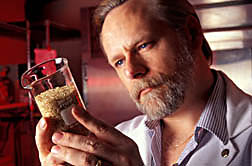High Selenium Leads to Weight Gain
|
|
Meals rich in selenium may slow the rate at which your body burns calories, ARS researchers report.
This preliminary result is based on a 4-month study of 11 healthy men. It suggests a possible benefit to patients with wasting syndromes such as those sometimes associated with AIDS and cancer. Experimental high-selenium therapies already proposed for these patients might additionally help them stop losing weight—and perhaps even gain.
Chemists Wayne Chris Hawkes and Nancy L. Keim did their selenium study at the ARS Western Human Nutrition Research Center in San Francisco. Their volunteers were age 20 to 45.
The five volunteers who ate foods high in selenium received about five times the Recommended Dietary Allowance, or RDA, of this mineral. These men gained about a pound and a half, despite the researchers’ efforts to keep everyone's weight stable.
The scientists attribute the weight gain to lowered levels of one of the body's thyroid hormones, known as T3, or triiodothyronine. Levels of another thyroid hormone, T4, didn't change. The thyroid, through hormones, handles a wide array of tasks. Among them: regulating your calorie-burning rate.
The six volunteers who ate foods that provided only about one-fifth of the selenium RDA increased their levels of T3—the hormone that is more active than T4—and boosted their fat-burning rates. They lost about 1 pound. That amount "isn't significant for dieters," Hawkes says, "but signals the body's response to a low-selenium regimen."
The change in the T3 hormone, revealed in blood tests, was unexpected, says Hawkes, because it contradicts results from animal studies done elsewhere. Mice and rats fed low doses of selenium had less T3 and more T4. Animals and humans use selenium to convert T4 into T3.
Instead of an unappetizing liquid formula spiked with selenium, the San Francisco study offered familiar foods. Volunteers ate rice from China that was harvested from regions where the soil is either rich or poor in selenium. Beef from selenium-rich South Dakota went into the high-selenium menus; low-selenium beef from selenium-deficient New Zealand was served to volunteers on the opposite stint.
Menus included hot rice sweetened with maple syrup or marmalade for breakfast; spaghetti with meat sauce, or beef with curried rice, tomatoes, green peppers, and onions for lunch; and beef and noodle casserole or beef and rice with teriyaki sauce at dinner.
Besides meats and grains from regions where soils contain ample selenium, seafoods are also a good source of the mineral. And dairy products and vegetables provide some of this essential nutrient, too.
In addition to its interaction with thyroid hormones, selenium is a powerful antioxidant that protects cells from peroxides, an oxidation byproduct.
Selenium deficiency is rare in the United States, except for patients who are fed intravenously for a long time. Selenium toxicity, too, is uncommon. ''However," cautions Hawkes, "selenium can be poisonous at only 10 times the RDA, so people shouldn't haphazardly gobble selenium supplements."
Hawkes plans to conduct a lengthier study to see if the same selenium-induced changes to thyroid hormones occur—and, if they do, how long they persist. — By Marcia Wood, ARS.
Wayne Chris Hawkes is in the USDA-ARS Western Human Nutrition Research Center, One Shields Avenue, University of California, Davis, CA 95616; phone (530) 752-5276, fax (530) 752-5271.
Nancy L. Keim is in the USDA-ARS Western Human Nutrition Research Center, University of California; phone (530) 752-4163, fax (530) 752-5271.
"High Selenium Leads to Weight Gain" was published in the October 1995 issue of Agricultural Research magazine.







